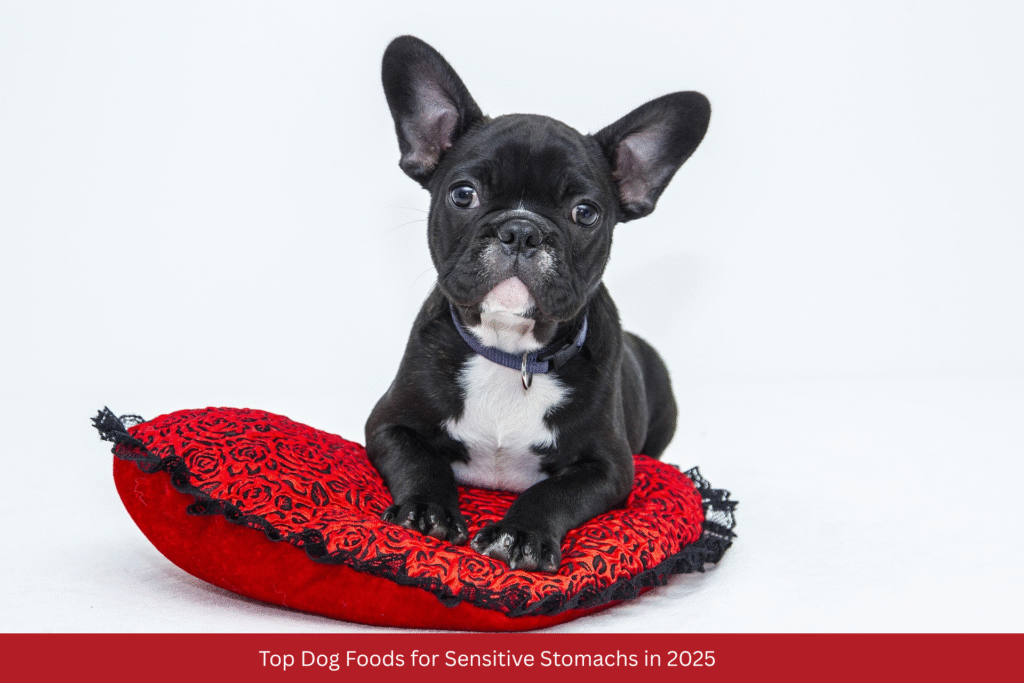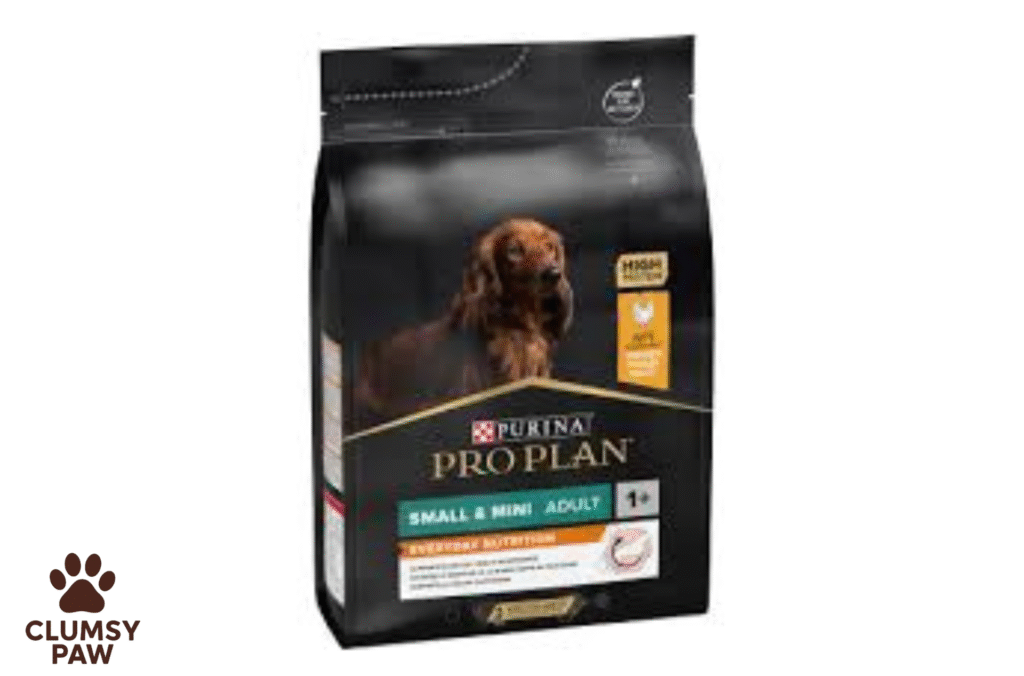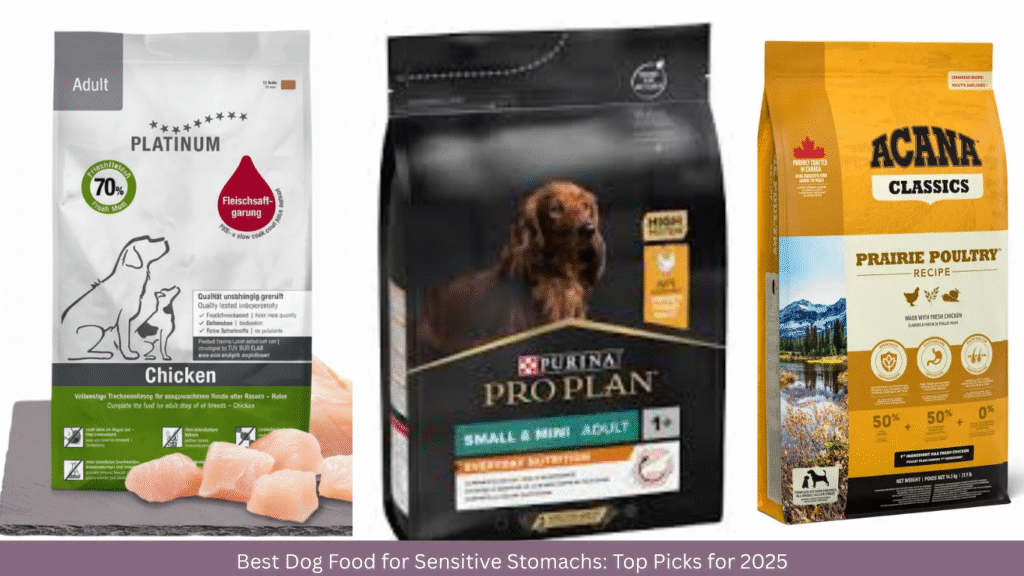Best Dog Food for Sensitive Stomachs If your dog suffers from digestive issues like vomiting, diarrhea, or gas, selecting the right food can make all the difference. In 2025, several brands have formulated diets specifically designed to soothe sensitive stomachs and promote optimal digestion. This guide highlights the top dog food options for sensitive stomachs, based on expert recommendations and customer feedback.

Understanding Sensitive Stomachs in Dogs
A sensitive stomach in dogs can manifest as:
- Frequent diarrhea or soft stools
- Vomiting, especially after meals
- Excessive gas or bloating
- Loss of appetite or weight loss
- Lethargy or discomfort
These symptoms often result from food intolerances, allergies, or low-quality ingredients. Choosing a high-quality, easily digestible diet can alleviate these issues and improve your dog’s overall health.
Top Dog Foods for Sensitive Stomachs in 2025
This dry dog food is formulated with prebiotic fiber and omega-6 fatty acids to support digestive health and nourish the skin. The chicken recipe is highly digestible, making it suitable for dogs with sensitive stomachs. It’s also free from artificial colors, flavors, and preservatives.
2. Purina Pro Plan Sensitive Skin & Stomach Salmon & Rice Formula
Recommended by veterinarians, this formula features salmon as the primary protein source, combined with rice for easy digestion. It includes live probiotics to support gut health and is designed to reduce digestive issues and promote healthy skin.

3. Royal Canin Veterinary Diet Gastrointestinal Low Fat Loaf in Sauce
Ideal for dogs with gastrointestinal issues, this wet food is low in fat and contains highly digestible proteins. It’s formulated to support dogs with sensitive stomachs and is available through veterinary prescription.

4. Taste of the Wild High Prairie Canine Recipe with Roasted Bison & Roasted Roa
This grain-free dry dog food uses novel proteins like bison and roasted venison, which are less likely to cause food sensitivities. It includes sweet potatoes and peas for digestible energy, and its high-quality ingredients support overall health.

5. Wellness CORE Digestive Health Chicken, Turkey & Duck Recipe
A high-protein, grain-free dry dog food that includes probiotics and prebiotic fibers to support digestive health. The combination of chicken, turkey, and duck provides a variety of lean proteins for sensitive dogs.

6. The Farmer’s Dog Fresh Dog Food
For those seeking fresh, human-grade meals, The Farmer’s Dog offers customized plans based on your dog’s specific needs. Their recipes are formulated by veterinary nutritionists and include ingredients like turkey, beef, and pork, tailored to support digestive health.
7. Jiminy’s Cravin’ Cricket Protein Dog Food
An innovative option using cricket protein, which is hypoallergenic and easy to digest. This limited-ingredient diet is free from common allergens like soy, corn, and wheat, making it suitable for dogs with food sensitivities.

Key Ingredients to Look for
When selecting dog food for a sensitive stomach, consider the following beneficial ingredients:
- Novel Proteins: Sources like salmon, turkey, or venison are less likely to cause allergies.
- Easily Digestible Carbohydrates: Ingredients such as sweet potatoes, rice, and oatmeal are gentle on the digestive system.
- Probiotics and Prebiotics: These support a healthy gut microbiome, aiding digestion and nutrient absorption.
- Omega Fatty Acids: Help reduce inflammation and support skin health.
- Limited Ingredients: Diets with fewer ingredients can help identify and eliminate potential allergens.
Ingredients to Avoid
To prevent digestive issues, steer clear of dog foods containing:
- Artificial Additives: Colors, flavors, and preservatives can irritate the digestive tract.
- Common Allergens: Wheat, soy, corn, and dairy are frequent culprits of food sensitivities.
- By-Products and Fillers: Low-quality ingredients can be hard to digest and offer little nutritional value.
Transitioning to a New Diet
Switching your dog’s food should be done gradually to avoid upsetting their stomach:
- Day 1-3: Mix 25% new food with 75% old food.
- Day 4-6: Mix 50% new food with 50% old food.
- Day 7-9: Mix 75% new food with 25% old food.
- Day 10: Feed 100% new food.
Monitor your dog for any adverse reactions during this transition period.
When to Consult a Veterinarian
If your dog continues to experience digestive issues despite dietary changes, it’s essential to consult your veterinarian. Persistent symptoms may indicate underlying health problems that require professional attention.
Conclusion
Selecting the right dog food for a sensitive stomach is crucial for your dog’s health and well-being. The brands and ingredients highlighted above are among the best in 2025 for supporting digestive health. Always consult with your veterinarian before making significant changes to your dog’s diet to ensure the chosen food meets their specific health needs.



